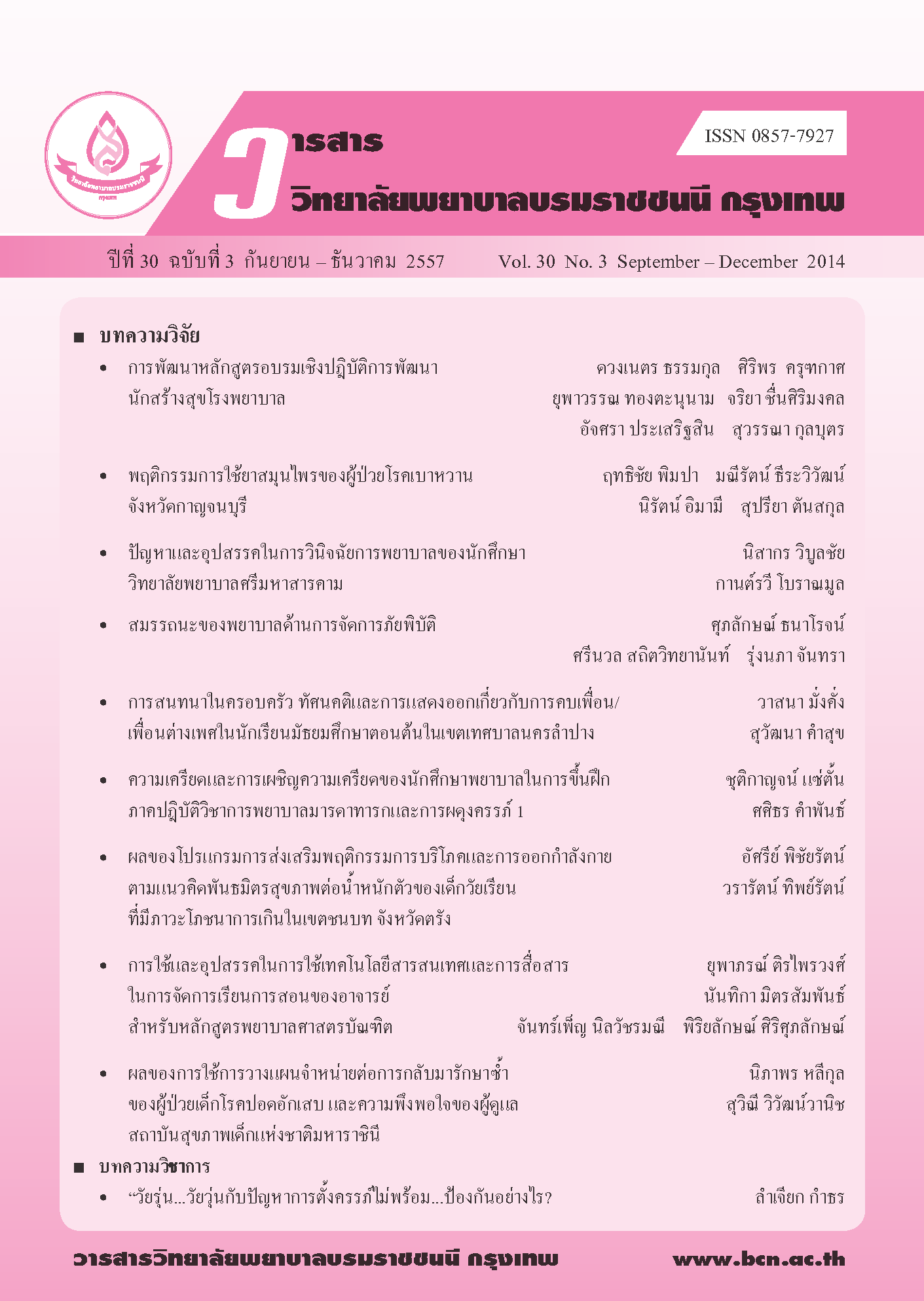ผลของโปรแกรมการส่งเสริมพฤติกรรมการบริโภคและการออกกำลังกาย ตามแนวคิดพันธมิตรสุขภาพต่อนน้ำหนักตัวของเด็กวัยเรียน ที่มีภาวะโภชนาการเกิน ในเขตชนบท จังหวัดตรัง EFFECT OF HEALTH ALLIANCE PROGRAM ON FOOD CONSUMPTION AND EXERCISE BEHAVIORS, AND WEIGHT OF OBESE SC
คำสำคัญ:
โปรแกรมพฤติกรรมการบริโภค, พฤติกรรมการออกกำลังกาย, แนวคิดพันธมิตรสุขภาพ, เด็กวัยเรียน, ภาวะโภชนาการเกิน, Health Alliance, concept program, food consumption, exercise behaviors, obese child, school-aged childrenบทคัดย่อ
บทคัดย่อ
การวิจัยครั้งนี้เป็นการวิจัยแบบกึ่งทดลองเพื่อศึกษาผลของโปรแกรมการส่งเสริมพฤติกรรมการบริโภค และการออกกำลังกายตามแนวคิดพันธมิตรสุขภาพ Funnel, Oldfield and Speller (1995) ต่อนํ้าหนักตัวของ เด็กวัยเรียนที่มีภาวะโภชนาการเกิน โดยสุ่มกลุ่มตัวอย่าง ได้แก่ เด็กวัยเรียนที่มีภาวะโภชนาการเกิน อายุระหว่าง 10-12 ปี ที่กำลังศึกษาอยู่ในระดับประถมศึกษาของโรงเรียนในเขต อ.ปะเหลียน จ.ตรัง ที่มีภาวะโภชนาการ เกินมากกว่าเกณฑ์มาตรฐานการประเมิน จำนวน 50 คน แบ่งเป็นกลุ่มทดลองและกลุ่มควบคุมกลุ่มละ 25 คน โดยจับคู่ด้านเพศและชั้นปีการศึกษา โดยที่กลุ่มทดลองได้รับโปรแกรมการส่งเสริมพฤติกรรมการบริโภคและ การออกกำลังกายตามแนวคิดพันธมิตรสุขภาพ กลุ่มควบคุมได้รับการดูแลตามปกติ เครื่องมือที่ใช้ในการทดลอง คือโปรแกรมการส่งเสริมพฤติกรรมการบริโภคและการออกกำลังกายตามแนวคิดพันธมิตรสุขภาพ ใช้ระยะเวลา 8 สัปดาห์ เก็บรวบรวมข้อมูลโดยใช้แบบสอบถามพฤติกรรมการบริโภคและการออกกำลังกาย และเครื่องชั่งนํ้าหนัก วิเคราะห์ข้อมูลโดย การแจกแจงความถี่ ค่าร้อยละ ค่าเฉลี่ย ค่าส่วนเบี่ยงเบนมาตรฐานและสถิติการทดสอบค่าที
ผลการวิจัยพบว่า เด็กวัยเรียนที่มีภาวะโภชนาการเกินหลังได้รับโปรแกรมการส่งเสริมพฤติกรรมการบริโภค และการออกกำลังกายตามแนวคิดพันธมิตรสุขภาพ มีคะแนนเฉลี่ยพฤติกรรมการบริโภคและการออกกำลังกาย สูงมากกว่า และค่าเฉลี่ยนํ้าหนักตัวลดลงมากกว่ากลุ่มที่ได้รับการดูแลตามปกติ อย่างมีนัยสำคัญทางสถิติที่ระดับ .01
ข้อเสนอแนะและการนำไปใช้ จากผลการวิจัยครั้งนี้ชี้ให้เห็นว่า การส่งเสริมการทำงานร่วมกันในการแก้ปัญหา ของเด็กวัยเรียนที่มีภาวะโภชนาการเกิน ระหว่างเด็ก ครู และผู้ปกครอง ตามแนวคิดพันธมิตรสุขภาพทำให้ พฤติกรรมการบริโภคและการออกกำลังกายของเด็กวัยเรียนที่มีภาวะโภชนาการเกินดีขึ้นและมีนํ้าหนักตัวลดลง
ABSTRACT
The purpose of this quasi-experimental research project was to investigate the effect of a collaborative, alliance based program promoting food consumption and exercise behaviors in obese school-aged children. The health alliance theory of Funnelet al. (1995) was used as the framework for this study.
A sample of 50 obese school children, 10 to 12 years of age, and studying at a primary school in a remote area of Trang province, Thailand was purposively enrolled. Participants were assigned to experimental and control groups (25 each) using matched pairs for gender and educational level. The experimental group received an 8-week heath alliance-based health promotion program on food consumption and exercise behaviors. Whereas, the control group received their usual standards based care. The instrumentality used was a triangulated approach program targeted at promoting healthy food consumption and exercise behaviors. The data was collected using a questionnaires and weighs scales. The data was analyzed using descriptive and t-test statistics.
The study found that the post program mean scores for food consumption and exercise behaviors in the experimental group were statistically significantly higher, while their average body weight was statistically significantly lower than those of the control group at p<.01.
In conclusion, the study findings suggested that the health alliance-based intervention program helped improve food consumption and exercise behaviors and decrease body weight among obese school-aged children. Moreover, it also pointed out the importance of collaboration involving three principals, the children, their teachers and their parents, in promoting those healthy behaviors.
Downloads
ดาวน์โหลด
เผยแพร่แล้ว
รูปแบบการอ้างอิง
ฉบับ
ประเภทบทความ
สัญญาอนุญาต
บทความที่ได้รับการตีพิมพ์ เป็นลิขสิทธิ์ของวารสารวิจัยสุขภาพและการพยาบาล (วิทยาลัยพยาบาลบรมราชชนนี กรุงเทพ) ไม่สามารถนำไปตีพิมพ์ซ้ำในวารสารฉบับอื่น


















